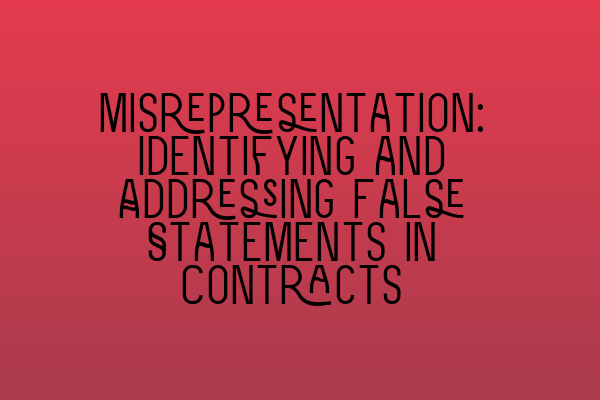Misrepresentation: Identifying and Addressing False Statements in Contracts
Contracts are the backbone of any business transaction. Whether you are purchasing a property, entering into a partnership agreement, or signing a service contract, it is crucial to ensure that the terms and representations made in the contract are accurate and truthful. However, there are instances where false statements, known as misrepresentations, can occur. In this article, we will explore what misrepresentation is, how to identify it, and the legal remedies available to address this issue.
What is Misrepresentation?
Misrepresentation refers to the act of making false statements, whether intentionally or unintentionally, that induce another party to enter into a contract. The misrepresentation can take various forms, such as providing false information, concealing relevant facts, or making misleading statements.
Types of misrepresentation include innocent misrepresentation, negligent misrepresentation, and fraudulent misrepresentation. Innocent misrepresentation occurs when a party makes a false statement honestly and believes it to be true. Negligent misrepresentation happens when a party makes a false representation without reasonable grounds for believing it to be true. Lastly, fraudulent misrepresentation occurs when a party makes a false statement knowingly, with intent to deceive and induce the other party to enter into a contract.
Identifying Misrepresentation
Identifying misrepresentation can sometimes be challenging, as it requires an understanding of the factual circumstances and the intentions of the parties involved. However, there are some common signs and red flags that can indicate potential misrepresentation:
- Unrealistic claims or promises: If the representations made in the contract seem too good to be true or overly optimistic, there may be a possibility of misrepresentation. Assess the feasibility and reasonableness of the statements carefully.
- Omissions of material information: If a party intentionally hides or fails to disclose relevant information that could affect the decision-making process of the other party, it can be considered a misrepresentation.
- Contradictions or inconsistencies: Pay attention to any contradictions or inconsistencies within the contract or the representations made by the parties. These inconsistencies may indicate potential misrepresentation.
It is essential to conduct thorough due diligence and seek professional advice when entering into a contract to minimize the risk of misrepresentation. Engaging the services of a knowledgeable contract lawyer can provide you with the necessary guidance and help identify any potential misrepresentation in the contract.
Legal Remedies for Misrepresentation
When misrepresentation occurs, the innocent party may have several legal remedies available to them:
- Rescission: Rescission allows the innocent party to “unwind” the contract, effectively returning both parties to their pre-contractual position. This remedy is available when the misrepresentation is material and induces the innocent party to enter into the contract.
- Damages: The innocent party may also be entitled to claim damages for any financial losses suffered as a result of the misrepresentation. The damages aim to compensate the innocent party and restore them to the position they would have been in had the misrepresentation not occurred.
- Rectification: In certain cases, the court may order rectification of the contract, which involves correcting the terms of the contract to reflect the true intentions of the parties. This remedy is available when there is clear evidence of mistake or misrepresentation in the contract documentation.
It is important to note that the legal remedies available will depend on the type and severity of the misrepresentation. Seeking legal advice promptly is crucial to understand your options and take appropriate action.
Conclusion
Misrepresentation can have serious implications on contractual relationships and can lead to financial losses and disputes. Understanding what misrepresentation is and how to identify it is essential for individuals and businesses entering into contracts. In case of misrepresentation, seeking legal guidance to explore available remedies is crucial to safeguard your rights and interests.
To further prepare for your contract law exams and develop a comprehensive understanding of contract law, check out our related articles:
